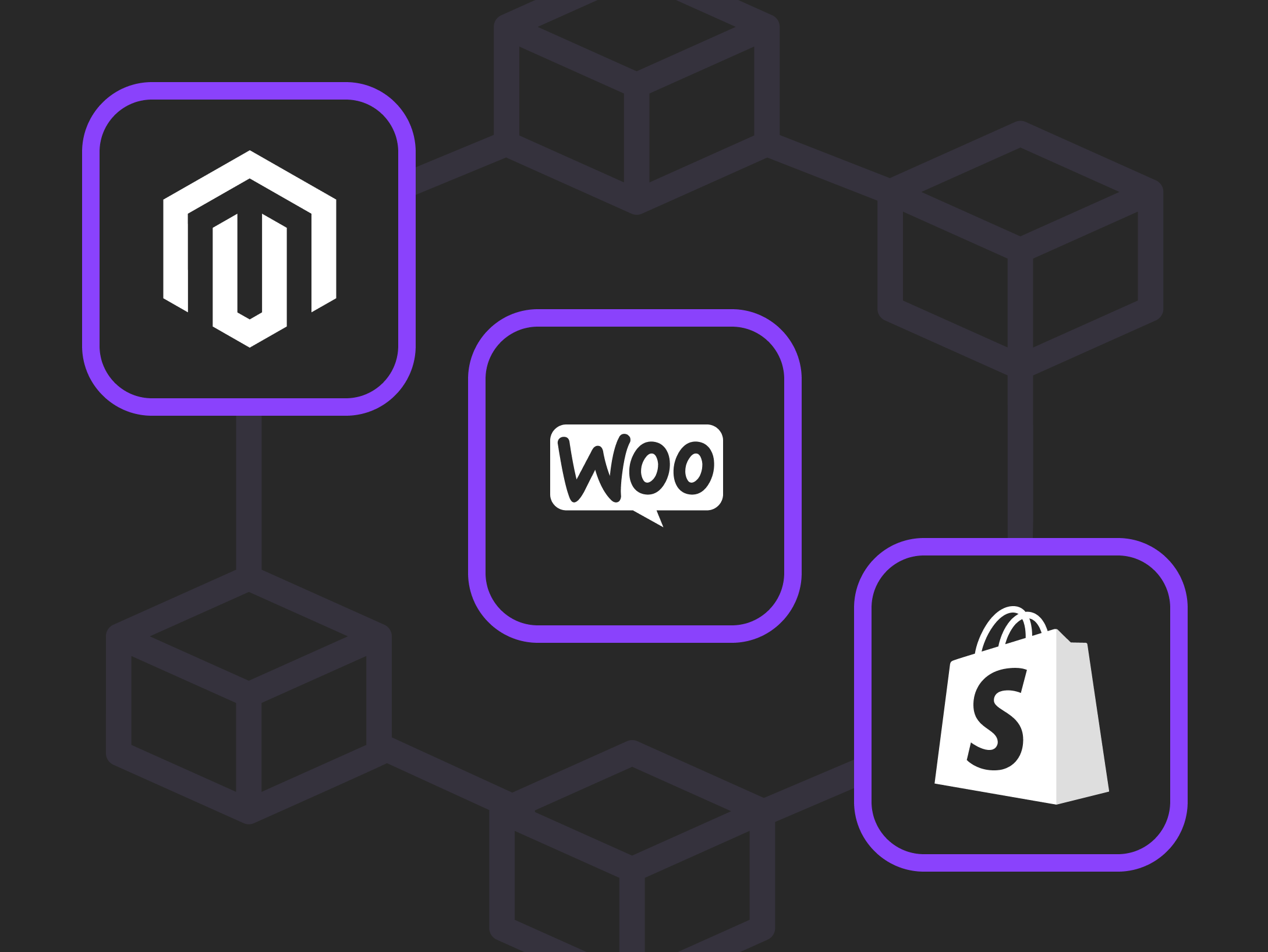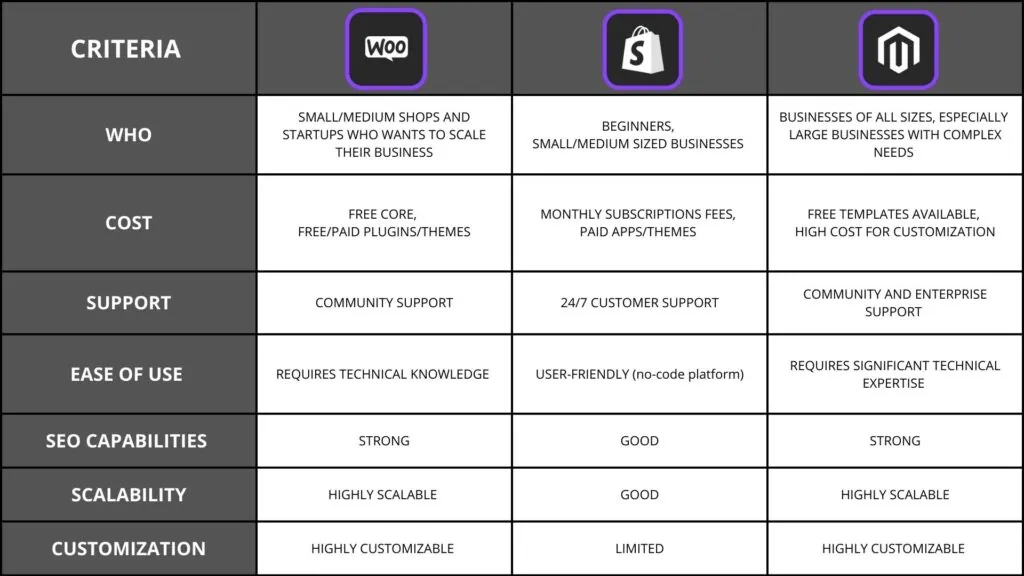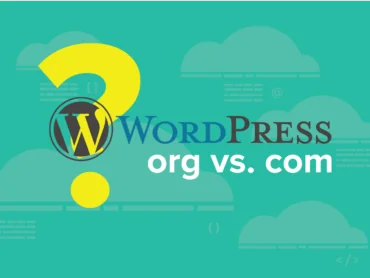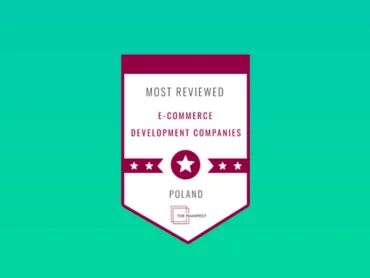WooCommerce, Shopify, or Magento? What’s the difference?

Are you thinking about creating an online store? Are you wondering which platform would be the best solution for you and your business?
Building a store can be a daunting task. The first and most important step during the planning phase is choosing the right e-commerce platform. With several options available, it can be challenging to decide which one best fits your business needs. However, this decision will significantly impact the success of your online store. In this article, you will learn about WooCommerce, Shopify, and Magento, and discover which platform will be the best choice for you.
What is WooCommerce?
If your brand is already entrenched in the WordPress system, WooCommerce may be the best choice for you. WooCommerce is a flexible, open-source e-commerce plugin for WordPress, designed to turn your website into a fully functional online store. It is a popular choice for small businesses, but it is also suitable for larger stores because WooCommerce doesn’t limit the number of products or variations you want to have. With WooCommerce, you have complete control over your website and data, allowing you to customize everything to fit your needs. The platform offers thousands of plugins and themes, so it is easy to add new features and enhance the look of your store. The core development team constantly works to update and optimize code to meet the latest needs in performance, security, and design. WooCommerce is also known for its strong SEO capabilities, leveraging WordPress’s robust SEO features to help improve your search engine rankings.
Launched in 2011, WooCommerce quickly became one of the most popular e-commerce solutions due to its flexibility, user-friendliness, and extensive ecosystem of plugins and themes.
Despite this, many customers who are considering this platform still have some concerns.
One of the primary concerns for customers considering WooCommerce is security. WooCommerce is continuously developed and updated to ensure it remains secure. It complies with GDPR (General Data Protection Regulation) regulations, allowing customers to request the deletion of their data, and it doesn’t store payment information in the database, significantly reducing the risk of it being compromised.
Another common concern is scalability. At our company, ambiscale, we have implemented WooCommerce solutions for stores with tens of thousands of products. Thanks to the high-quality code of our templates and optimal environment configuration, these stores operate very quickly. We understand how crucial loading speed is for sales, and our implementations ensure that even large WooCommerce stores perform very well.
WooCommerce does require some technical know-how to set up and manage. You’ll need to handle your hosting and maintenance, which can be a drawback for some users. However, the extensive community and resources available make it easier to find support and solutions to any challenges you might face.
What is Shopify?
Launched in 2006, Shopify is a leading e-commerce platform known for its ease of use and comprehensive features. This platform is a great choice for first-time e-commerce merchants, because of a hosted solution. Shopify operates as a SaaS (Software as a Service) model. As a business owner, you don’t need to worry about server issues, site performance, or platform updates; these are all included in the subscription you pay for. Shopify takes care of all the hosting, security, and maintenance, making it ideal for beginners. The SaaS model is popular in the United States and Western Europe. If you plan to expand into these markets, Shopify could be a suitable choice.
With Shopify, you can set up your online store quickly using its intuitive interface and numerous pre-designed themes. It offers a wide range of features, including built-in payment processing, inventory management, and marketing tools. However, due to the system’s specifications, you won’t be able to modify certain components or functionalities of the store. Shopify also has an extensive app store, allowing you to add extra functionality to your store as needed. One of its key benefits is the excellent 24/7 customer support available to help you with any issues.
Shopify is available in many languages. This makes creating your store and managing customer interactions easy and intuitive.
Unfortunately, as mentioned, Shopify is priced on a subscription model. The costs of using it vary depending on the plan you choose and any additional services, such as apps, store themes, and payment methods (Shopify payments charge a transaction fee that varies depending on the plan you choose).
What is Magento (Adobe Commerce)?
Launched in 2008, Magento (rebranded to Adobe Commerce) is a robust e-commerce platform designed for larger businesses with complex needs. It’s highly customizable and scalable, making it ideal for stores with extensive product catalogs and high traffic. Magento offers both open-source and enterprise versions, catering to businesses of all sizes. The platform comes with a rich set of built-in features, including advanced inventory management, multi-store capabilities, and powerful SEO tools. While Magento is flexible, it requires significant technical expertise to set up and maintain. Hosting and development costs can also be high, especially for the enterprise version. However, for businesses that need a powerful and customizable solution, Magento is a top choice. The platform also has a large community and extensive resources, providing support and solutions for various business needs.
Before choosing Magento, it’s advisable to consult with a company like ours to make an informed decision and ensure the platform is adapted to your specific needs. At Ambiscale, our experts consider all factors to help you choose the best solution. Take a look at our calendars and choose the date that suits you best.
Switching e-commerce platforms
Even if you already run a successful e-commerce store, you should periodically assess whether your current platform meets all your needs. As consumer trends and industry dynamics evolve, so do your goals and requirements. Regularly evaluating your platform ensures you are using the best available tools to support your business. Switching e-commerce platforms can be challenging, but with careful planning and the right support from our specialists, you can achieve a seamless transition that enhances your store’s capabilities and growth potential. You can read more about switching platforms in the ‘Services: e-commerce migration‘ section.

So, which one is the best? WooCommerce, Shopify, or Magento?
WooCommerce, Shopify, and Magento are three go-to e-commerce platforms. Choosing the right one for you depends on your business size, technical expertise, budget, and specific needs.
Each of these e-commerce platforms has its own set of advantages. WooCommerce is ideal for those who seek flexibility and have some technical know-how. Shopify is perfect for a straightforward, hassle-free setup with excellent support. Magento is the top choice for large businesses with extensive needs and resources.
No matter whether you choose WooCommerce, Shopify, or Magento, each platform provides the ability to analyze website traffic and understand how users navigate through your site. Our experts from ambiscale can support you with any issue, anytime.
In conclusion, each platform’s strengths and limitations will help you make an informed decision that suits your business needs.
If you’re deliberating between Shopify and Shopify Plus, we recommend reading our detailed article on their differences to help you select the best option for your business: Shopify vs Shopify Plus.
Summary

Comparison of WooCommerce, Shopify, and Magento based on specific criteria



